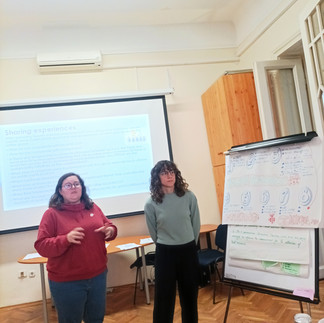Capacity building initiatives for citizens and NGOs: training event - Budapest, 20 February 2024
- Tessy Melidi
- Mar 9, 2024
- 3 min read
Updated: Sep 15, 2024
An international workshop on "Supporting and building the capacity of citizens and civil society organisations to facilitate more participatory processes and citizen involvement" was held on 20 February at the Municipal Information and Coordination Centre (TÖOSZ) in Budapest.
The event brought together experts from Greek, Romanian, Slovenian and Spanish municipalities and associations of municipalities in the framework of the international project "Active Cities for EU" in cooperation with TÖOSZ.
The meeting was hosted by Dr Ferenc Gyergyák, Secretary General of TÖOSZ, who welcomed the guests, followed by Ioannis Emirzas, Deputy Mayor of Kallithea, who also welcomed the participants on behalf of the Lead Partner.
The workshop included the presentation of the Civil Business School, a good practice of the Municipality of Óbuda-Békásmegyer, 3rd District of Budapest, which won the 2022 Award of the TÖOSZ Best Local Government Practices Programme. The aim of the programme is to promote partnerships between local businesses and NGOs operating in the district. Ferenc Burján, Deputy Mayor of the District, explained that local NGOs have gained a lot of professional experience and knowledge from the business sector, but it was also a great opportunity for NGOs, which will be continuously extended to other districts of the capital.
Following the presentation by Mr Burján and the Civil Impact LTD -a not for profit company that supports the implementation of the Civil Business School- the participants started working together in small groups. The session ended with summary presentations from each group and discussion on participants’ experience with NGOs, issues of local citizens and public participation and cooperation between municipalities and businesses.
Then participants from Xátiva explained how a Spanish town of 30,000 inhabitants close to Valencia, has a clear and well-designed municipal structure to support residents and NGOs in making their voices heard and expressing their opinions on common issues. The city has a Social Council, which is divided into different sectors: youth, women's empowerment, education, sport and culture.
A good example cited by the delegation from Xàtiva was the Solidarity Fair (Fira Solidària), which was attended by almost the entire educational community of Xàtiva, schools and art academies, as well as local groups focusing on the most disadvantaged people. The money raised by this fair will go to local groups.
The Romanian Association of Counties (UNCJR) explained the situation in their country, where municipalities are required by law to support NGOs operating on their territory. As in Hungary, there is a state programme to support volunteering at local level.
The Association of Metropolitan Cities in Slovenia (ZMOS) said that there are many ways of strengthening civic participation through local NGOs and the private sector. Popular techniques include participatory budgeting or the local government donating 1% of its budget to NGOs. Businesses are involved in strategic partnerships in sustainable urban planning and development processes. Good examples mentioned are: open city living room, creative labs, Hackathon, Land Art.
The municipality of Kallithea also works with local citizens and local NGOs in a well-developed and sustainable system, with three rounds of consultation before the strategic plan is finalised: first with the employees of the municipality, then with key local stakeholders, and finally an open to the public consultation for citizens to express their views and ideas. One example of a public consultation was the development of the Open Mall -the consultation was carried out by National Technical University of Athens. Another example is the urban planning around the Stavros Niarchos Foundation.
The next event of the project will be held in Athens.



























Comments